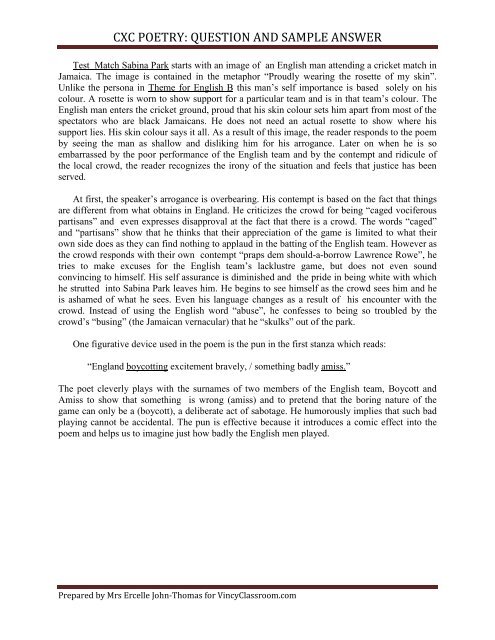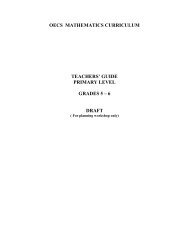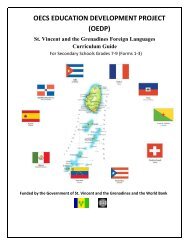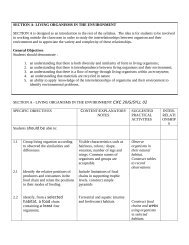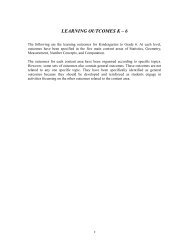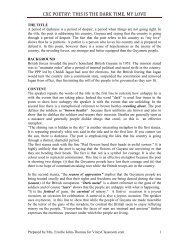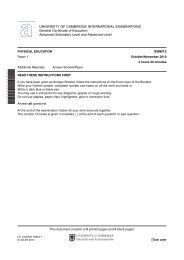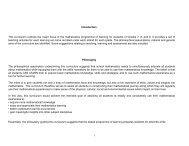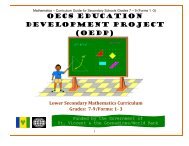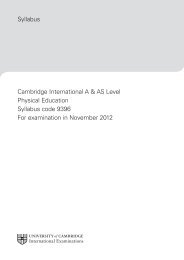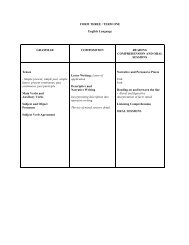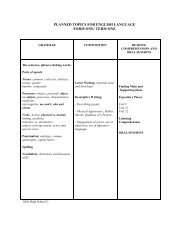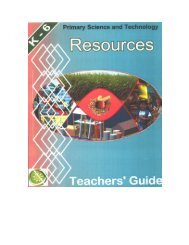CXC POETRY: QUESTION AND SAMPLE ANSWER - VincyClassroom
CXC POETRY: QUESTION AND SAMPLE ANSWER - VincyClassroom
CXC POETRY: QUESTION AND SAMPLE ANSWER - VincyClassroom
You also want an ePaper? Increase the reach of your titles
YUMPU automatically turns print PDFs into web optimized ePapers that Google loves.
<strong>CXC</strong> <strong>POETRY</strong>: <strong>QUESTION</strong> <strong>AND</strong> <strong>SAMPLE</strong> <strong>ANSWER</strong><br />
Test Match Sabina Park starts with an image of an English man attending a cricket match in<br />
Jamaica. The image is contained in the metaphor “Proudly wearing the rosette of my skin”.<br />
Unlike the persona in Theme for English B this man’s self importance is based solely on his<br />
colour. A rosette is worn to show support for a particular team and is in that team’s colour. The<br />
English man enters the cricket ground, proud that his skin colour sets him apart from most of the<br />
spectators who are black Jamaicans. He does not need an actual rosette to show where his<br />
support lies. His skin colour says it all. As a result of this image, the reader responds to the poem<br />
by seeing the man as shallow and disliking him for his arrogance. Later on when he is so<br />
embarrassed by the poor performance of the English team and by the contempt and ridicule of<br />
the local crowd, the reader recognizes the irony of the situation and feels that justice has been<br />
served.<br />
At first, the speaker’s arrogance is overbearing. His contempt is based on the fact that things<br />
are different from what obtains in England. He criticizes the crowd for being “caged vociferous<br />
partisans” and even expresses disapproval at the fact that there is a crowd. The words “caged”<br />
and “partisans” show that he thinks that their appreciation of the game is limited to what their<br />
own side does as they can find nothing to applaud in the batting of the English team. However as<br />
the crowd responds with their own contempt “praps dem should-a-borrow Lawrence Rowe”, he<br />
tries to make excuses for the English team’s lacklustre game, but does not even sound<br />
convincing to himself. His self assurance is diminished and the pride in being white with which<br />
he strutted into Sabina Park leaves him. He begins to see himself as the crowd sees him and he<br />
is ashamed of what he sees. Even his language changes as a result of his encounter with the<br />
crowd. Instead of using the English word “abuse”, he confesses to being so troubled by the<br />
crowd’s “busing” (the Jamaican vernacular) that he “skulks” out of the park.<br />
One figurative device used in the poem is the pun in the first stanza which reads:<br />
“England boycotting excitement bravely, / something badly amiss.”<br />
The poet cleverly plays with the surnames of two members of the English team, Boycott and<br />
Amiss to show that something is wrong (amiss) and to pretend that the boring nature of the<br />
game can only be a (boycott), a deliberate act of sabotage. He humorously implies that such bad<br />
playing cannot be accidental. The pun is effective because it introduces a comic effect into the<br />
poem and helps us to imagine just how badly the English men played.<br />
Prepared by Mrs Ercelle John-Thomas for <strong>VincyClassroom</strong>.com


